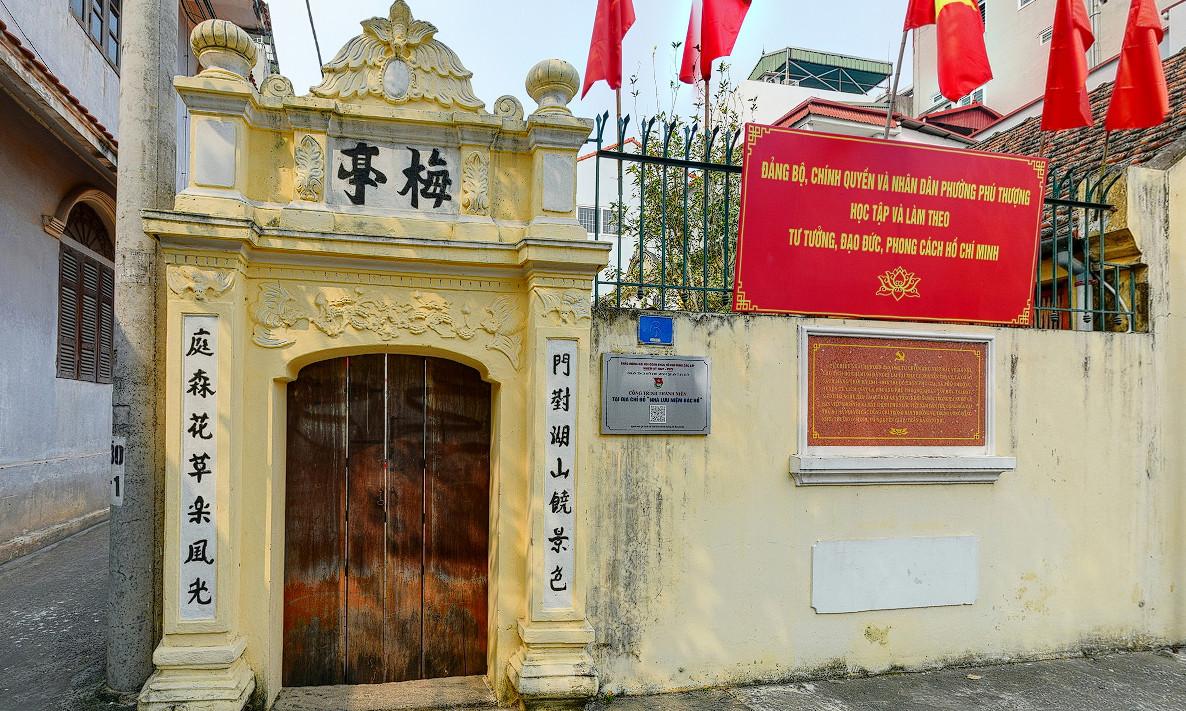
No.6, Lane 319, An Duong Vuong Street, Phu Thuong ward

Introduce
Phu Thuong is an ancient land near the city and has long been associated with Thang Long – Ha Noi. For thousands of years, the people here have worked diligently to build their hometown villages, creating a tradition of patriotism and strong resistance against foreign invaders to protect the country.
Following the Communist Party, Phu Thuong had become a safe place for the Party Central Committee, concealing and shielding many senior Party leaders and being the first site to greet President Ho Chi Minh when he returned to the capital city from the Viet Bac war zone.
Uncle An's home (previously) at Phu Gia village, Phu Thuong commune, Tu Liem district, is now Phu Thuong ward, Tay Ho district, and has been preserved as Uncle Ho's monument since 1996. Several of Uncle Ho's souvenir relics are in Ha Noi, but Uncle An's home at Phu Gia village was Uncle Ho's first stop on his way back to Hanoi from the Viet Bac war zone to draft a declaration of independence, giving birth to the Socialist Republic of Vietnam.
Phu Thuong is strategically located as the gateway connecting Hanoi with surrounding provinces and has a highly convenient road and canal transit infrastructure. Therefore, it was considered a safe location for the Party Central Committee in the period of 1941-1945. Comrade Truong Chinh wrote about choosing this safe zone (ATK):
“Don't linger in the gloomy forest
Establish a secure zone near the capital
Capture the enemy's condition and the pulse of the popular movement
What could be more fantastic than this?
Xuan Dinh, Phu Gia, Ngoc Giang, Vien Hoi
The outposts that battled and pushed the attackers away...”
(Excerpted from Comrade Truong Chinh's poem written for Xuan Dinh commune when he visited here on February 8, 1981 – “Lich su Cach mang Huyen Tu Liem”, p.66-67).
Phu Gia and Phu Xa were revolutionary bases of the Party from 1941 to 1945, located in the Party Central Committee's Safe Zone. The people were early awakened to follow the revolution; they hid and protected the Central Committee's permanent comrades, many senior Party officials such as Truong Chinh, Hoang Van Thu, Le Duc Tho, Hoang Tung, etc. These comrades moved, lived and met with many grassroots families in two villages (Phu Gia and Phu Xa) for 5 years in safety. Almost no comrade was arrested, and no incident affected the revolutionary movement.
Phu Gia and Phu Xa were also placed in the Liberation Flag newspaper. They were the communication station with the Regional Party Committee and Provincial Party Committees throughout the country by the Party Central Committee. The Phu Xa ferry terminal was a transport hub connecting the north and south banks of the Red River in the Safe Zone. The local people transported and protected many Party officials who passed through the river safely.
Phu Thuong ward also organized meetings in the middle of the Red River riverbank to listen to comrades Le Duc Tho and Hoang Tung talk and organize Viet Minh's secrit self-defense development. These meetings were also military training to obtain guns and ammunition in French barracks for Vietnamese people equipment, depriving 6 French rice vessels on the Red River to rescue from famine.
Based on these premises, the Central Committee's permanent comrades have chosen the home of Uncle An in Phu Gia village as a safe place for the Party Central Committee, where Uncle Ho stopped before returning to Hanoi.
The book “Nhung lan don Bac,” stated that: at the end of August, after gaining power, the Hanoi people were waiting to welcome the new temporary government of Vietnam. The letter from Nguyen Ai Quoc calling for the people to rise and break the chains of slavery had been passed around to everyone, making them eager to welcome Uncle Ho back to the country.
Some local officials and self-defense forces were waiting for the returning delegation from the Viet Bac region at Phu Xa ferry. A boat with a bow moored at Phu Xa around 4 p.m. Around ten young, healthy individuals and an old man clothed in brown clothing, with a dark complexion, a long beard, a slender physique, and leaning on a cane, arrived at the dock. Those who came to greet him were shocked and wanted to know who he was since the elderly guy had an uncommon style and was escorted by Liberators with guns to defend him. However, according to the secrecy restrictions at the time, everyone stayed mute. The group of authorities and the elderly guy had a little respite at the Phu Gia self-defense headquarters. The old man sat and relaxed on a wooden limb in the shade of an ancient tree, conversing with the village elders about prices, food, and village life. Anh Khanh (Comrade Hoang Tung), who had arrived from the city center, informed the old man about popular sentiment in Hanoi on General Lu Han's forces coming. At this time, the self-defense troops had prepared and invited the elderly guy to join them for the meal. Over twenty individuals ate happily at three tables on two military counters.
Mr. Khanh had found a rest place for the delegation, and now that it was late, he invited the old man and the committee to stay at Uncle An's house in Phu Gia village, a family base of Anh Khanh since before the uprising.
In the diary “Nhung nam thang khong the nao quen”, comrade Vo Nguyen Giap recounted: "... the situation was critical; we were extremely delighted that comrade Tho was assigned to the war zone to welcome Uncle Ho back. Then, comrade Ninh and I traveled to Phu Gia to greet Uncle Ho. We traveled into Gac village, where Uncle was in a modest but neat brick house and observed Uncle conversing with the owners. Uncle sat patiently listening as we passionately relayed the state of the rebellion in Hanoi and the regions. The National Liberation Committee led by Uncle would become the temporary government, according to the conclusion of the national convention convened in Tan Trao... We returned to Hang Ngang street to prepare, and comrade Nhan (i.e., comrade Truong Chinh) arrived later, stayed there, and returned with Uncle Ho in the afternoon.
Thus, for three days (from August 23, 1945, to August 25, 1945), Uncle Ho worked with comrades Truong Chinh, Vo Nguyen Giap, and Tran Dang Ninh at Uncle An's home in Phu Gia on the results of the general uprising throughout the country and prepared for the Independence Declaration day.
The monument of Uncle Ho - Uncle An's house in Phu Gia has been renovated and presented as a key historical event in learning revolutionary traditions and honoring the great Uncle Ho for future generations. This is a memorial location for Uncle Ho's event, where people recollect the amazing years of the nation, with the honor of receiving President Ho Chi Minh back to the capital from the Viet Bac war zone to give birth to the Socialist Republic of Vietnam. In late August 1945, Uncle An's home and the Phu Gia - Phu Thuong monuments became part of the country's history. The preservation and development of Uncle An's historical legacy are manifestations of respect for history, a profound recollection of Uncle Ho's blessings to the people of Hanoi and the whole country. This monument is also vivid evidence contributing to the study and understanding of the art as well as the talented writings of President Ho Chi Minh and the Communist Party of Vietnam in leading the entire people to seize the newly born young government; particularly in ensuring the safety of the beloved national leader in any situation, in both secret and public activities, always ensuring strict principles but the simplicity, and surprising.
Uncle An's home is where Uncle Ho stayed for a very short period, but his deep love and affection for the local people still resonate through many generations. The Party and the people of Phu Thuong ward always remember the images, gestures, and caring words of Uncle Ho and strive continuously to fulfill his heartfelt desires.
Artifacts
Map
Nearby Places
No. 43C, alley 497, quarter 2, group 15, Lac Long Quan Street, Nhat Tan Ward
2.79Km
Lane 242, Lac Long Quan Street, Buoi Ward, Tay Ho District, Hanoi.
No. 20, Lane 472, Cluster 3, Lac Long Quan Road, Nhat Tan Ward, Tay Ho District, Hanoi.
No. 07, Lane 30, Tay Ho Road, Quang An Ward, Tay Ho District, Hanoi.
3.31Km
Residential Area No. 5 (No. 3, Lane 200, Au Co Road), Tu Lien Ward, Tay Ho District, Hanoi.
3.79Km
Residential Area No. 5 (No. 3, Lane 200, Au Co Road), Tu Lien Ward, Tay Ho District.
3.43Km